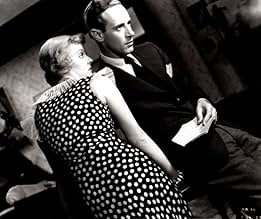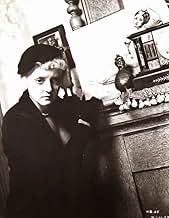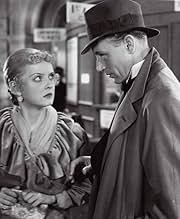IMDb RATING
7.0/10
8.9K
YOUR RATING
A young man finds himself attracted to a cold, unfeeling waitress who might ultimately destroy them both.A young man finds himself attracted to a cold, unfeeling waitress who might ultimately destroy them both.A young man finds himself attracted to a cold, unfeeling waitress who might ultimately destroy them both.
- Director
- Writers
- Stars
- Nominated for 1 Oscar
- 3 wins & 1 nomination total
Frank Mills
- Chimneysweep
- (scenes deleted)
Harry Allen
- Cabbie at End
- (uncredited)
Ray Atchley
- J. Murphy
- (uncredited)
Frank Baker
- Policeman Removing Mildred
- (uncredited)
Evelyn Beresford
- Coughing Lady
- (uncredited)
- Director
- Writers
- All cast & crew
- Production, box office & more at IMDbPro
Featured reviews
The clubfooted aspirant painter Philip Carey (Leslie Howard) is advised by an acquaintance to give-up his artistic ambition since he is a mediocre artist. He joins the medical school in London using his inheritance to pay the school and to have a comfortable life. When he meets the cold cockney waitress Mildred Rogers (Bette Davis) in a restaurant, the shy Philip has a crush on her but she rejects him. Philip stalks her and dates her; however the easy woman scorns him. When Philip proposes Mildred, she tells him that she is going to marry her lover Miller (Alan Hale), leaving the brokenhearted Philip obsessed for her. He tries to move on, dating the affectionate Norah (Kay Johnson) in an unrequited love. However, when Mildred returns alone and pregnant, Philip lodges them in his home. Sooner Mildred becomes lover of Philip's friend Reginald Denny (Harry Griffiths) and leaves Philip again. When Philip finds Mildred and her baby later abandoned on the street, he brings them home. Mildred unsuccessfully tries to seduce Philip but he loathes her; Mildred feels humiliated and wrecks his apartment and burns his savings, forcing Philip to quit the medical school. However his teacher offers to operate his feet first and Philip becomes a normal man. But he does not succeed to find a job and his life goes downhill fast until he meets a friend that helps him.
"Of Human Bondage" is an unpleasant romance about unrequited love, betrayal and sexual obsession. The restrictions of the moral code of the society in the 30's force the director and screenplay writer to be vague and open in many scenes, destroying the full understanding of the plot like, for example, the dialog between Sally and Philip in the last scene. I found a reasonable explanation in the IMDb Message Board from a user that read the novel. The good point is that there is no use of clichés and the story is not dated. I loved the performance of Bette Davis, but I am a great fan of this awesome actress therefore my opinion might be compromised. However, the nomination to the Oscar also corroborates with my comment. In Brazil, this movie was released on DVD by Continental Distributor. My vote is seven.
Title (Brazil): "Escravos do Desejo" ("Slaves of the Desire")
"Of Human Bondage" is an unpleasant romance about unrequited love, betrayal and sexual obsession. The restrictions of the moral code of the society in the 30's force the director and screenplay writer to be vague and open in many scenes, destroying the full understanding of the plot like, for example, the dialog between Sally and Philip in the last scene. I found a reasonable explanation in the IMDb Message Board from a user that read the novel. The good point is that there is no use of clichés and the story is not dated. I loved the performance of Bette Davis, but I am a great fan of this awesome actress therefore my opinion might be compromised. However, the nomination to the Oscar also corroborates with my comment. In Brazil, this movie was released on DVD by Continental Distributor. My vote is seven.
Title (Brazil): "Escravos do Desejo" ("Slaves of the Desire")
A good, historical movie for the Bette Davis fan in that this is the first movie where she was noticed, based on her merits as an actress. This was a role that was offered to others, but "others" thought that playing such an evil "belladonna" role would harm their career. Bette never flinched from playing the "bitch" and it helped push her career forward. Bette does a good job in this story of an evil woman and the man who just won't/can't let her go. As another writer here has stated, this should be required viewing by young men. The scary thing is, there truly ARE such women out there. A cautionary tale that delivers..
Bette Davis became a star with her role in this first and best film adaptation of the Somerset Maugham novel of the same name (well worth a read). This was her first nomination for an Academy Award, for her portrayal of Mildred Rogers; a tawdry, sluttish, cockney waitress who bewitches hapless Philip Carey (Leslie Howard, best known for his role as Ashley Wilkes in "Gone With the Wind"). She lost the award, receiving it for her role the following year for "Dangerous", which is generally viewed as a consolation prize.
The supporting cast includes Reginald Denny, Alan Hale Sr. (father of Alan Hale Jr., who was the skipper on the TV series "Gilligan's Isle"), and a breathtakingly beautiful Frances Dee.
The film starts out with Philip, a failed art student with a clubfoot of which he is highly sensitive, turning to the study of medicine after facing the fact that he has no artistic talent. Shortly thereafter he meets and quickly becomes obsessed with Mildred, despite her sneering and obvious disdain for him because of his deformity. Her standard response to his affectionate overtures is a chilly "I don't mind." In his dreams Mildred is sweet and kind to him; during real time she uses him, well aware of his affection for her, leaving him for other men and returning when she is down on her luck, ruining his chance for having a career or a normal life with another woman; he seems to continually finds himself inexorably drawn to her, even after his love for her has waned, until the day she finally pushes him too far.
At that point, the camera fully turns to Mildred as her facial expression shifts from supplication to shock to full-on bitch in a matter of seconds, and she reacts to Philip's statement with a barrage of blood-curdling insults. Bette Davis as Mildred never fails to raise the hair on the back of my neck and arms with her performance in this particular scene.
This is the role that made Davis a star. It's also one of my all-time favorite Davis films, along with such others as "The Little Foxes", "The Letter", and "All About Eve".
The supporting cast includes Reginald Denny, Alan Hale Sr. (father of Alan Hale Jr., who was the skipper on the TV series "Gilligan's Isle"), and a breathtakingly beautiful Frances Dee.
The film starts out with Philip, a failed art student with a clubfoot of which he is highly sensitive, turning to the study of medicine after facing the fact that he has no artistic talent. Shortly thereafter he meets and quickly becomes obsessed with Mildred, despite her sneering and obvious disdain for him because of his deformity. Her standard response to his affectionate overtures is a chilly "I don't mind." In his dreams Mildred is sweet and kind to him; during real time she uses him, well aware of his affection for her, leaving him for other men and returning when she is down on her luck, ruining his chance for having a career or a normal life with another woman; he seems to continually finds himself inexorably drawn to her, even after his love for her has waned, until the day she finally pushes him too far.
At that point, the camera fully turns to Mildred as her facial expression shifts from supplication to shock to full-on bitch in a matter of seconds, and she reacts to Philip's statement with a barrage of blood-curdling insults. Bette Davis as Mildred never fails to raise the hair on the back of my neck and arms with her performance in this particular scene.
This is the role that made Davis a star. It's also one of my all-time favorite Davis films, along with such others as "The Little Foxes", "The Letter", and "All About Eve".
After laboring in Hollywood for nearly four years, playing one nothing role after the other in one forgettabe film after the other, Davis won the role of a lifetime. That of slatternly waitress Mildred Rogers, the 'bitch' heroine of Somerset Maugham's classic story. Davis in BONDAGE is an example of an actress's triumph. Lester Cohen's script, making for a picture that runs in length 83 minutes, is breezy and admittedly fails to capture all of the qualities that made Maugham's book such a compulsive read. But Bette Davis' performance in BONDAGE makes the film every bit as good as the book itself. She is absolutely fascinating. Her role of Mildred is as spiteful and bitchy as they come. Yet Bette plays the part so well that you can't help but root for her. That's not to say that she doesn't overdo it at times. But she is clearly into the role and rightfully so. Having played so many thankless background parts(secretaries, gun molls, etc.), this was her chance to break loose and show critics and audiences alike her full capabilities as an actress, and did she ever! Even keeping in mind all of the memorable Davis movie moments that followed, Mildred Rogers still remains her most stunning achievement. The great British actor Leslie Howard, playing the club-footed medical student who becomes infatuated with Mildred, seems over-powered, and possibly intimidated by his co-star. Oh yes, Davis was not yet a full-fledged star and was supposed to be playing second fiddle to the already distinguished Howard, but with BONDAGE, that situation quickly reversed. Shockingly, Davis didn't receive so much as an Oscar nomination for her brilliant performance, and when she won a year later for the tired melodrama DANGEROUS, everyone(including Bette herself) assumed it was out of sympathy for not receiving her full due for this film.
Coming shortly before the imposition of a morality code darkened the spirits of writers, directors and actors, the first film adaptation of W. Somerset Maugham's "Of Human Bondage" titillated countless moviegoers. It has no shock value today, just fine acting.
While the cast is excellent, this is Bette Davis's first great role and one of Leslie Howard's best performances. Howard is English wannabe Parisian artist Philip Carey who is gently and firmly told that he lacks any talent and that his dedication is no substitute for true genius. Taking the lesson to heart he returns to London and enrolls in a medical college (one, by the way, that seems to have no female students-at that time there would have been at least a few. Perhaps author/physician Maugham didn't care for distaff medicos).
Having tea one day Carey is entranced by a waitress, Mildred Rogers, Bette Davis in a role as a morally loose and basically wicked farrago. Her Cockney accent is as sharp as Eliza Doolittle's. His repeated attempts to date her are greeted with the less than enthusiastic reply, "I don't mind," a sure sign for any man with his head screwed on straight that he's plumbing the depths. Maugham's Mildred supplemented her waitress tips with a bit of old fashioned street-walking, something not clearly brought out here.
Carey's besotted prostration serves Rogers' avaricious need for support of the financial kind. He is desperately in love with her-she plays him as a Sunday church organist effortlessly plies her instrument. No sex here. Recognizing that he is getting nowhere, he begins a chaste relationship with Norah, a woman who adores him. Re-enter Mildred, replete with a baby, and in her usual need of being taken care of. Exit heartbroken Norah.
Another separation from Mildred and Carey begins a long-term friendship with Sally, abetted enthusiastically by her dad who seems to view eventual marriage as both a good thing for the two young people and a chance to be relieved of one of his nine offspring.
The movie reasonably but not entirely follows Maugham's excellent novel. Howard's Carey is naive and vulnerable and for much of the movie his sad eyes remind one of a doe facing a double-barreled shotgun. Mildred is unrestrainedly wicked, a user of the worst kind, her sole preoccupation with her own needs barely disguised when she tries to wheedle Carey with a thin patina of affectionate words (and offers-at one point she promises she'll do "anything [he] wants," a daring statement for the times and one I'm sure audiences fully understood.
Pre-Code it may be but Mildred's quick-march dissolution would have satisfied the League of Catholic Decency. The ending is conventional-sin loses, principled behavior triumphs.
Director John Cromwell wrought excellent performances from his two main stars, one well-established, the other established largely because of this film. The atmosphere is 1930s London and the trip back in time is worth taking.
Available on DVD.
9/10 (for Davis's and Howard's performances)
While the cast is excellent, this is Bette Davis's first great role and one of Leslie Howard's best performances. Howard is English wannabe Parisian artist Philip Carey who is gently and firmly told that he lacks any talent and that his dedication is no substitute for true genius. Taking the lesson to heart he returns to London and enrolls in a medical college (one, by the way, that seems to have no female students-at that time there would have been at least a few. Perhaps author/physician Maugham didn't care for distaff medicos).
Having tea one day Carey is entranced by a waitress, Mildred Rogers, Bette Davis in a role as a morally loose and basically wicked farrago. Her Cockney accent is as sharp as Eliza Doolittle's. His repeated attempts to date her are greeted with the less than enthusiastic reply, "I don't mind," a sure sign for any man with his head screwed on straight that he's plumbing the depths. Maugham's Mildred supplemented her waitress tips with a bit of old fashioned street-walking, something not clearly brought out here.
Carey's besotted prostration serves Rogers' avaricious need for support of the financial kind. He is desperately in love with her-she plays him as a Sunday church organist effortlessly plies her instrument. No sex here. Recognizing that he is getting nowhere, he begins a chaste relationship with Norah, a woman who adores him. Re-enter Mildred, replete with a baby, and in her usual need of being taken care of. Exit heartbroken Norah.
Another separation from Mildred and Carey begins a long-term friendship with Sally, abetted enthusiastically by her dad who seems to view eventual marriage as both a good thing for the two young people and a chance to be relieved of one of his nine offspring.
The movie reasonably but not entirely follows Maugham's excellent novel. Howard's Carey is naive and vulnerable and for much of the movie his sad eyes remind one of a doe facing a double-barreled shotgun. Mildred is unrestrainedly wicked, a user of the worst kind, her sole preoccupation with her own needs barely disguised when she tries to wheedle Carey with a thin patina of affectionate words (and offers-at one point she promises she'll do "anything [he] wants," a daring statement for the times and one I'm sure audiences fully understood.
Pre-Code it may be but Mildred's quick-march dissolution would have satisfied the League of Catholic Decency. The ending is conventional-sin loses, principled behavior triumphs.
Director John Cromwell wrought excellent performances from his two main stars, one well-established, the other established largely because of this film. The atmosphere is 1930s London and the trip back in time is worth taking.
Available on DVD.
9/10 (for Davis's and Howard's performances)
Did you know
- TriviaIn later years, Bette Davis said that she found Leslie Howard very frosty and this actually helped her performance, particularly for the scenes requiring her to be horrible to him.
- GoofsAthelny's mustache and beard are almost coming unstuck when he is eating dinner.
- Quotes
Mildred Rogers: You cad, you dirty swine! I never cared for you, not once! I was always makin' a fool of ya! Ya bored me stiff; I hated ya! It made me sick when I had to let ya kiss me. I only did it because ya begged me, ya hounded me and drove me crazy! And after ya kissed me, I always used to wipe my mouth! Wipe my mouth!
- ConnectionsEdited into Liquid Television: Episode #2.10 (1992)
- SoundtracksHesitation Blues
(1915) (uncredited)
Written by Billy Smythe, Scott Middleton and Art Gillham
Played when Mildred is tearing up the apartment
Details
Box office
- Budget
- $403,000 (estimated)
- Runtime
- 1h 23m(83 min)
- Color
- Aspect ratio
- 1.37 : 1
Contribute to this page
Suggest an edit or add missing content































